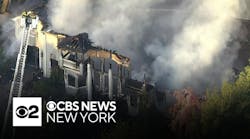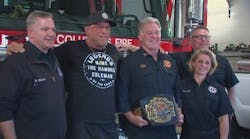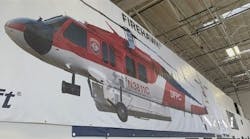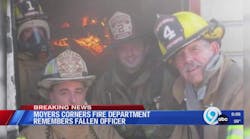As the member of a fire service organization, you will continually be subjected to the influences created by the three major elements of any organization. These are:
- Organizational structure.
- Organizational process.
- Organizational behavior.
I have found during my many years of fire service experience that there is one sure guide for you on your way through the rocks and shoals of your organizational ocean. These are the policies that have been established to guide the operation of your particular organization.
It is the wise leader who masters the art of policy development. There is no better way to leave a lasting imprint on your fire department than to take a strong leadership role in laying out your road map to success.
It has also been my experience that you must become intimately familiar with the concept of policy and what its impact will be for you and your fire department. I would like to use an example to assist you in understanding where I am headed with this concept.
Would you ever consider starting out on a long journey to a faraway location without a road map? I don't think so. Just as you would need a map to guide you on a trip through some strange and unfamiliar territory, so then is a policy book your guide through the world of organizational operations.
A number of terms are synonymous with policy. It has been my experience that an individual organizational member must become familiar with the terms mission statement, policy statement, standard operating procedure or however they are named in your organization. A leader who fails to master these concepts and bring his or her agency into the development mix risks destroying the very fabric of the fire department.
There are a number of items that I collectively lump under the heading of policy. Regardless of what your agency might choose to call them, policies offer the guidance necessary for you to get your job done in an effective and efficient manner. To use a phrase that is popular in the world of community bands, "You all have to be playing from the same sheet of music." Think about how bad it would sound if the flutes were playing Beethoven, the trumpets were playing Mozart, and the tuba section was belting out a fine old Sousa march. You would have a cacophony of chaos.
And so it is with fire departments, as it is with all organizations. I have noted that a major problem faced by fire departments across America revolves around the fact that they are entering new areas of operational expertise, where old ideas and training are just not good enough to get the job done.
To protect itself and its members, the organization must set down, in writing, the ways in which it intends to do business, so that all personnel can operate to a common denominator; similar rules and uniform procedures. Lest you set off in pursuit of writing policy without a method to use in accomplishing the task, take heart for I am about to give you some much-needed help.
The greatest problem I have seen in the policy-making arena over the years has been the tendency that some people have for starting out on their trip to a workable policy without knowing what it is that they wish to accomplish. You have to know what you want the policy to do before you can write a policy to do it.
If you feel that your department's response to daytime fires should be standard, then you must decide, before hand, which units you wish to send to a particular type of incident. You would then specify the manner in which they are to respond. Something that does not specifically pertain to daytime response should not be a part of any daytime response policy. And so it must be with every aspect of how your fire department operates. There should be a definitive written policy. This is critical. Otherwise, you might discover that you have several different sub-fire departments operating within your agency.
Who makes policy within an organization? Usually, policy is a matter for the upper echelons of an agency. It is typically formulated by the individual in charge of the organization or by designated representatives. Policy must come from the top so that it is broad-based enough to bring all members of the group into conformance with the mainstream of group thoughts and actions.
It is in the arena of policy development where the best leaders really get to show their stuff. They are so thoroughly conversant with the people in the organization and the ways in which they work that they are able to distill the true essence of the operation. They are so thoroughly trusted by the members of the organization that their requests for help from the troops are met with enthusiastic support.
This is a theme that came through many times during the group-think research back in the 1999-2000 time frame. True leaders had their finger on the pulse of the fire department. This knowledge, when coupled with their skills at creating consensus, allowed them to develop a solid focus for their fire department. They were then able to follow through and lead their people in the proper direction.
Let me now share with you my view of the policy-making process. The first step in any policy development scenario involves setting the objective to be accomplished by the policy matter under consideration. Once this has been accomplished, someone must be charged with the responsibility for assembling the necessary resources to study the issues surrounding the policy study.
You must be sure to search far and wide for possible solutions. I have found that it is the rare problem that has not been solved by someone else in another place. Study the various model codes, research documents, trade journals or professional texts, or contact members of other fire departments around the country.
Do not overlook the value to be derived from membership in professional associations. By being active professionally, you can develop a network of personal and professional acquaintances. It may be that someone has already written your policy for you, so search far and wide for information. We have used this approach on a number of occasions.
It is critical for you to read and review the professional literature that you receive. The effective leader is enthusiastic about learning and shares this motivation with their troops. While this might seem like an obvious next stage in your policy drafting process, many people gather reams of data, only to overlook most of it and write what pleases them and call it their policy.
It has long been my contention that the more that you know about a topic, the better able will you be to handle yourself in any discussion on the merits of your proposed policy. It is easy to tell when you are speaking with someone who has only a superficial knowledge of a particular topic. They deal in surface generalities. They can speak about none of the necessary background facts and details. Do not become this type of person. Gather the necessary facts to set the stage for your efforts at writing policy. Become the knowledge expert.
I would suggest that you will eventually come to a point where you feel that you have enough information to proceed. At this time you must decide whether to go it alone and write the policy yourself; or build a team to study the information you have gathered, with an eye to brain storming for fresh ideas. I would urge the use of many divergent opinions, if at all possible. People will have a better buy in on anything that they have had a hand in creating. This is called the buy-in factor.
An important point that must be discussed here deals with the amount of specialized technical knowledge that might be needed to write the policy. If you wish to write a policy handling the disposal of leaking drums of toxic material, it would be nice if you were able to gather a group of people who know something of how to handle leaking drums.
The same would hold true for firefighting operations, EMS, personnel or payroll matters. For most situations, it is better to have a task group work on a problem with the combined weight of a number of different minds and points of view. Occasionally, there is a need for outside participation in areas involving other agencies of your own municipality or other surrounding municipalities in a mutual aid scenario.
There might also be a need for administrative approval of department-level policy decisions requiring municipal government approval. Be sure not to overlook any crucial player. Leaving certain people out of the loop will create ill will, slow down your operation and perhaps ultimately kill the policy.
In those cases in which a large group is needed, the wise leader will set up task groups within the larger group to avoid duplication of effort. Be sure that everyone agrees on the time frames for task accomplishment and that every one is using common terminology and thought references. You can really get lost if everyone is working from a different script. It has been said that beauty is in the eye of the beholder. In this case, the leader has to build consensus on just what beauty looks like. The vision must be shared and understood if the policy is to succeed.
It has been my experience that the amount of time you will spend working on the policy document will vary from project to project, depending on the complexity of your policy study and the number of issues that must be considered. Be sure to schedule sufficient meetings to coordinate the efforts of all task groups as they study existing information and uncover new data sources. It is also critical for you to be aware of time frame issues. In this way, people will not race ahead of the group or lag behind it. Coordination of time and effort should always be a major concern for policy development teams.
At some point, you will be ready to actually write the policy in question. In some situations, it is relatively easy to jot down your thoughts for a clear new policy governing an existing procedure or a simple, clear-cut matter. In other instances, it may require a number of revisions to coordinate your efforts. However it turns out, be diligent in your efforts and work to get the most out of your group.
When you have the policy on paper in its final written form, someone has to make the final decision and declare that it is the law of the land for your fire department. If you have the final say in policy matters, this is not an issue. However, if you have to convince someone of the merits of a new policy, prepare an educational message on just what the new policy is and what you intend for it to accomplish. And then sell it to them.
Once you have received the necessary approvals for your new policy, you have to see that it is put into use by your fire department. The best way to insure that a new policy will fail is to print it up and ship it out to the troops in your department, along with a notice which says quite simply, "Do it!"
Let me suggest that the proper implementation methodology for a new policy is an educational process. People must know the exact reason for the policy and its intended outcome. If people know the true reason behind a change in policy, they will normally work to become acquainted with the change.
It has been my experience that most people want to do their job properly. If you want to make reasonable changes and can demonstrate the logic and reason behind these changes, people will come on board in a reasonable time. Change is always a difficult matter, but resistance to change can usually be won over by knowledge and reason. Treat people like logical, thinking beings and they will respond. Bring them into the process as much as possible.
After a reasonable period of adaptation to a policy change or addition, the supervisors in the organization are responsible for the new policy as a matter of daily consequence. If a new policy is not enforced, people in the organization will simply not obey it. It is up to you, as a responsible fire officer, to become familiar with your organization's policy and work to see that it is used to guide your daily operations. This leads to a more productive organization.
Times change; that is a fact of life. It is up to you and your organization to see that its policies are continually checked for currency, applicability and validity. If you have taken the time to develop a well-thought-out set of organizational policies, then it behooves you to continually review them to see that they still fit your operation's needs.
So why bother with policy at all? You do this because your organization and its members will work more effectively if they are moving toward common goals using a common set of methods. This will avoid needless duplication of effort, disharmony and operational malfunctions where people work in opposing directions.
Some of the major policy impact areas are:
- Organizational effectiveness (getting job done).
- Operational efficiency (using resources wisely).
- Improved personnel safety.
- Better training and discipline (easier to pin things down).
- Define scope of employment for liability purposes.
Writing policy can be a difficult, boring task. Even the best of our leaders know this. However, if you want to succeed as a leader in your organization, you will apply yourself to writing a series of truly solid policies.
The rewards can be manifold. Your people will appreciate your effort. More than that, your organization will become a strong, effective and efficient influence within your community.
Harry R. Carter, Ph.D., MIFireE, a Firehouse® contributing editor, is a municipal fire protection consultant based in Adelphia, NJ. He is also an associate professor at Mercer County Community College and a past chief and active life member of the Adelphia Fire Company. Dr. Carter retired from the Newark Fire Department in 1999 as a battalion commander. He also served as chief of training and commander of the Hazardous Materials Response Team. Dr. Carter is a Member of the Institution of Fire Engineers of Great Britain (MIFireE). He may be contacted through his website at [email protected].




